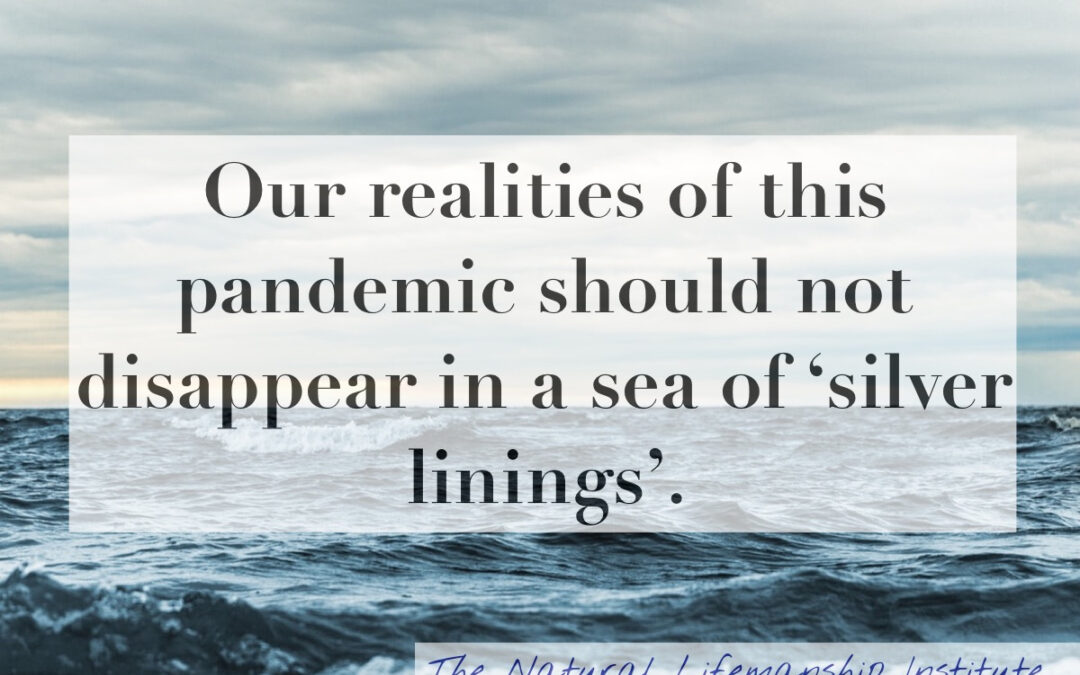By Bettina Shultz-Jobe and Kate Naylor
We, at Natural Lifemanship, are seeing so many memes and posts encouraging people to take advantage of this dramatic change of current life – to see the meaning in it, to relish it, to consider it a gift. While this is certainly not easy, many can find these sentimental reframes encouraging and inspiring, and through mindful practice can find a sense of calm about having nowhere to be besides at home with a partner, spouse, or children. These feelings can win out over bouts of fear and anxiety. This is a good thing. That said, to experience the pandemic this way is a complete and total privilege – it is, indeed, a gift.
Make no mistake, what is happening in our country and across the globe right now is trauma for all of us. How we support each other through this will make a difference in how traumatizing this year will be for us and those around us, certainly. But there are some (many, in fact) who are not encouraged by said memes. Many will not be able to make rent April 1st. Many can no longer afford to feed their children. A record 3.3 million Americans applied for unemployment just last week. Many are terribly ill and unable to get adequate medical care. Many are experiencing toxic and chronic stress because their survival is in question. To these people, the pandemic is not about leaning into a slower, simpler life. To many, what has happened so quickly in our country, is, in no way, a gift.
Here’s the thing, whether you are in the very privileged category, the category devastated by the fallout, or somewhere in between, this is trauma. We all owe it to ourselves to acknowledge it, at the very least, because minimizing the profound effect this is having on us all, will only make it that much harder for us to truly seek the connection needed to collectively heal.
Our simplest definition of trauma is when the things we sense (see, hear, taste, smell, touch, feel) are unpredictable or arrhythmic. A trauma (or traumatic situation) becomes traumatizing when our bodies and brains adapt to tolerate the arrhythmia in our world – this is what it means to embody the trauma. The more powerless, alone, and responsible we feel, the greater the survival concern, the more likely it is that a trauma becomes traumatizing. In short, trauma has the power to change us, but what is traumatizing to one person may not be to another.
We often think of war veterans and PTSD when we think of trauma, but trauma can result from many aspects of life. Financial uncertainty, housing and food insecurity, dramatic relationship changes, chronic stress, and like now, natural disasters, can all be potentially traumatizing. Changes often look like heightened vigilance with increased anxiety, or the opposite, increased dissociation with a sense of “checking out” too often. These changes affect our ability to function well in daily life – we are so anxious or checked out that we are unable to do things considered “typical”. We all have different thresholds for how much trauma changes us; our thresholds are influenced by how healthy things were before the trauma – our genetics, our intrauterine experience, our childhoods, etc.
The good news here is that we can do things to build resilience to trauma and we can heal from trauma. In this pandemic specifically, we know the trauma is happening and so we can take action now and throughout, to support ourselves and each other. Many will be able to experience this time as a period of growth and transformation. Nevertheless, it is safe to say no one will come out of the pandemic unchanged – but how much we change will vary greatly, based on how hard our history has been and how severe our current circumstances are during this time. Some of us will spend more time at home, get creative about work and child-rearing, and perhaps learn to live with a little less. But some of us will lose businesses, livelihoods, even homes. Some of us will experience significant health issues and perhaps even deaths. Many families will experience abuse and neglect. All of us will experience grief. What makes the same event hard for one person and devastating for another is complicated – It is vital that we acknowledge both are happening. Our realities of this pandemic should not disappear in a sea of “silver linings”.
Some of us need to remember, without shame, that to be home and well with family, is a privilege. To be able to work from home and care for children, is a privilege. To have a partner, and to have them also be able to work from home, is a privilege. To be able to buy food, even in fits and starts, is a privilege. For our children to feel safe at home is a privilege. To be able to make the mortgage payment despite work adjustments and financial shifts, is a privilege. To be well, not in need of emergency medical care, not in need of hospitalization, is just good luck. To those who experience so much privilege, it is your job (at the very least) to hold space for those who don’t. To remember, to do what you can to help, to acknowledge and speak up.
So what can we do, individually and collectively? It is tempting to avoid this question because of the deep sense of powerlessness it can bring. Our stomachs drop, throats clench, and we become buried in scary news about the realities we are facing and then feel completely overwhelmed. This is us experiencing the beginnings of trauma – our body and brain are experiencing fear and powerlessness. If we continue on this path, our brain and body will begin to habituate to these sensations and feelings until they become the new normal. Fear and overwhelm will no longer be a state we are in, but a trait we carry with us always (this is what it means to embody trauma).
We need to pause. Put down the news. Move our bodies and breathe deeply. Look or go outside and notice the movement of the trees and the way the light slants across the ground. Remind our brains and bodies that we are safe, at least, in this moment. When our body begins to relax, our higher self emerges again and we remember that there are things we can do. We can notice others in their struggle, we can listen, we can care, we can connect. Some of us can donate money. Some of us can give of our time – to make something, to support someone, to give something away, to learn more about what others are doing to help and join in. In this way, we feel empowered in the face of fear. We can move through this time and not be traumatized. We will be changed, but we don’t have to be traumatized. Not everyone will be so lucky, but we can build a place in our heart to remember that.
Even though we are separated into our homes, we are not separate. Connection can happen at any distance, but it does take practice. We can be stronger after this – but for that to be true, those of us lucky enough to feel empowered owe those of us who don’t. For that to be true, we must come together in community. We must move together. Sing together. Dance together. Those of us who are stronger must set the pulse – set the rhythm. We must bring those struggling among us into our rhythm and our fold. This is why NL is offering so many community activities online during this time of global trauma. We need each other. Join us. Join us as we seek to find rhythm together. Join us if you are strong – we need you. Join us if you are in need – we’ll carry you. Join us if you believe that trauma has the power to connect us all and make us stronger.
Check out the many ways that NL is here to support YOU (at no cost) during this time!
Want to become part of the best community ever, gain access to hours of rich online learning content and more?!! Check out NL membership.
Join our mission and our legacy by contributing to the NL scholarship fund. Supporting even one practitioner in this field has a powerful and exponential impact!



Recent Comments